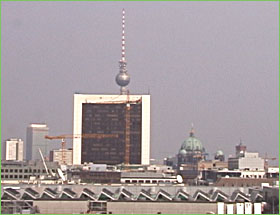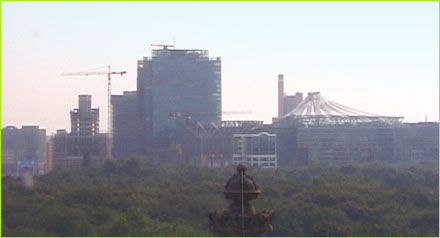| in Plain Text |
| Current features |
| Past articles |
| main features |
| spoken word: Book of Voices |
| poetry video: Videotheque |
| background: about e-poets |
| other features |
| network neighborhood |
| e-poets network partners |
| artist Heather Haley Vancouver, BC, Canada |
| Cinasphere Vallejo, California, USA |
| Poet in Residence Queensland, Australia |
| Farrago Poetry London, England |
|
artist Patrick Sanchez poet-at-large |
| e-poets network Chicago, Illinois, USA |
follow us  on Facebook on Facebook |
On translating cultures
A case study of signifying between distinct cultures. How does the general public learn culture in a city like Chicago? How does that kind of education prepare us for the greater world? And who is responsible for that education?
filed 28 September 2001 | Chicago by Kurt Heintz
dancing in the streets: Chicago
Every year about this time, Chicago's city fathers conspire a small beer and bratwurst festival in Lincoln Square. I hesitate to call it a German cultural festival. It doesn't expose much of German culture, and what it does expose is pretty basic in terms of food and drink. It's bread and circus in one gesture, and a fun diversion for many. It's well-intended, and bears a nice historical reminder that a certain German captain helped win the American Revolutionary War. But something's missing, as I see it.
In August, my publisher flew me to Germany for the release of Rude Trip, an anthology of Chicago and Hamburg writers that collects our observations on Chicago, the Midwest, and America into a very nifty bilingual, hardcover book. The trip took me to Hamburg and Berlin, where I saw much of the Germany I know. Sorry to say this, but it isn't what was in the streets of Lincoln Square just after Labor Day. This was my third extended encounter with Germany, all in service to cultural exchange and advancing new writing.
Germany is cosmopolitan and edgey with smart writers. It has historical, gothic, and rococo palaces on one hand, and mod trance and goth rave clubs on the other. People do drink beer at curbside, but it feels more civilized than a blocked-off neighborhood beer fest, particularly in Berlin where the city is so intensely on the "re-make". People stop for beers at cafés and restaurants after visiting their local cinemas, theaters and cabarets. Often they are between shows. They've seen an early revue and are on their way to a later one or a nightclub. I briefly visited Berlin three years ago, and found that much the city was overhauled since my last visit. Drastic changes, but largely for the better. The city has a great life.
|
The going theme in new German architecture seems to be glass and open trusswork, and couldn't be further from gingerbread. You see the building in the glass form, and you see the contents of the building through the glass form. The beautiful new Bundestag, the rebuilt national parliament in Berlin, is the best example that comes to mind. It beams with light. The public may view the parliament's activity through a glass rotunda, ringed with ramps such that people may walk all the way to the top of the dome from the inside. Compared to the Bundestag, the US capitol feels like an overbuilt Greek urn, and Chicago's Thompson Center (Helmut Jahn's whack design not withstanding) looks like a cheap kitchen appliance. Germany signifies sophistication. Classy, imaginative art. A consciousness of the past, but an eye on the future. How I wish Chicago's city fathers would consider celebrating this instead of a romanticized Germany of the past.
Societies embrace those bits of other cultures that mean the most to them, regardless of the source culture's feelings. The United States is no exception. Regarding Germany, that oompah band style may work for the Deutsch-Chicago old-timers, but it's a far cry from reality.
Of course, Americans want to romanticize the Old World. In some ways, it's necessary so we can cope with history we may know too well. But does this soft-pedaling of history diminish our lessons, and therefore our world wisdom? When we think of Africa, for example, do we want to think of it in ideal terms -- a land of ancient civilizations, with colorful arts, music, dances and feasts? Or how it is in the news -- a hodge-podge of democracies and dictatorships, occasional economic successes peppered with famine, poverty, civil war, and plague? When we go back to Germany, do we necessarily want to relive World War II and all its hell? When we consider Vietnam, do we want to think about My Lai and agent orange when we're really interested in sipping a good bowl of lemon grass soup and watching traditional theater? How long must the black and white P.O.W. flags fly, and so signify a war that's never really been put in America's past? Certainly we mustn't forget the wars and their grief, but cultural celebrations must sometimes delicately step past history -- perhaps exceed history -- in order to be a success and encourage healing between estranged societies.
When we have our ethnic neighborhood festivals in Chicago, someone at City Hall chooses how to represent the old country's culture. That representation may not necessarily be consistent with fact, but such gestures educate the public who often lack direct contact with foreign cultures. So government mediates foreign cultures for us, even at the city and neighborhood levels. That places responsibility on the public to make sure that City Hall gets it right; the public should not sit passively and accept a festival just because it's a city sponsored spiel.
To Chicago's (and City Hall's) credit, there are many diverse channels that offer authentic cultural learning besides street fests. For German culture, the Goethe-Institut is ideal. For French culture, the Alliance Francaise is a great venue. For Mexican culture, the Mexican Fine Arts Center in Pilsen can't be beat... it's the best such museum in the USA. Art galleries and other arts presenters often plug into the present-day themes of other nations' arts. The Experimental Sound Studio has sponsored much international collaboration among new music composers and sound artists; Chicago is strongly represented in Europe through ESS, as ESS has given European artists strong positive representation in Chicago. Gene Coleman's Ensemble Noamnesia new music group has done the same, including musicians and composers from Europe and Pacific Asia. The Chicago Council on Foreign Relations sponsors diplomats from around the world to lecture in our city. Even though it is not a political capitol, Chicago has a worldly mix of diplomats, merchants, and artists. If you really want to understand the world, it is out there waiting for you to pay it a call. Simply go, watch, and listen. And be sure to let the world speak to you on its own terms.
Let's come back to our case with Germany. When we say "German" (or any other ethnicity), we're always faced with a problem of accurate representation. I write this with the USA on the brink of a war where, it seems, representation is itself a weapon in the rhetoric between nations. But do we get the representation thing right in America, even with our friends? Can we Americans accurately understand the friendly parts of the world in terms that do not embarrass those whom we're describing, nor embarrass us?
The key to avoiding that mess is having cultural literacy. In the States, it's often easy to spot a native world traveler because they've learned the rules: They know how to represent themselves respectfully; they know how to express sincere respect for other cultures; they understand deference and good manners; they can balance a personal sense of right and wrong against the rules of other societies who may have values that are very different from their own; and they learn by seeing and doing, by unmediating the world for themselves, by dealing first person with its everyday compromises. This wisdom does not come from watching MSNBC and the foreign market reports. It's earned in the streets of foreign lands, in farmers' markets, at theater lobbies, metro stations, restaurants, and bank kiosks.
Since we can still readily access German society -- face it, it's still possible to fly there -- and since Germany is Western like America but also has a distinct worldview, it behooves us to study Germany. It's a good first step toward grappling with the problem of representation before we embark on more radically different cultures.
dancing in the streets: Berlin
I'll illustrate the problem by taking you, the reader, where America's own representation isn't quite the way we Americans know our own lives to be. For an American such as me, it's not always clear what Germans think the real America is. Germans can be opaque. I can relate my own experiences from growing up here in the States, but are these what an everyday German expects from an American? Germans do experience much of America through TV, movies, the Internet, and pop music. So they know something about us, but what? I know from my experience over there that I won't feel too far from home if I can get to a TV with cable service. CNN and American hip-hop music are on 24x7. But that's not really America, is it?
Here's a vignette of the former East Berlin: Boris Preckwitz, a local slam meister, and I bicycle through the center of town at night. I'm not sure where we're heading, but we come upon a dark square about a block or two west of the Telekom tower, that silver spine with a bulb-shaped observation deck. The East built it as a TV transmission center years ago. The dark square is surrounded by broad streets of fast-moving traffic. Boris says that we're at a memorial to Marx and Engels, the co-authors of the Communist Manefesto. But nobody is there. Or rather, we can't see anyone. The lack of light in the park makes the going difficult. I'm quite curious about this place, but my urban instincts suggest we could be ambushed or mugged. Boris says something about not wanting to stick around. So we leave as quickly and unceremoniously as we arrived. We never slow our bikes long enough to even step off the pedals, and the only thing that was red in the whole neighborhood was the Telekom tower. It lit up in a bright fuschia against the evening sky, as if to say, "Hey, have we got our TV and cell phones ready for you, baby!" My expectations of Berlin are now just a bit ajar. I wonder whether this moment is a parable for Germany's western aspirations.
|
We lock our bikes and go in. Suspicions confirmed. It's a freaky funky Friday party. We get invitations to come back next week to the club's "Tussi DeLuxe" party. (The definition of "tussi" is somewhere between the American English "fashion plate", what the British think of when they say "tart", and the Mexican slang word "pollosa." Add that to the global vocabulary, eh?) It takes a while for the party to get started, but it definitely gets started. By 1:00 AM, the place is jumping with young Germans, mostly working class kids from what was once the East. Berlin buildings generally lack air conditioning, and the day has been hot in the Chicago summer tradition, very out of character for northern Europe. So the whole place is very stuffy. The air is thick with sweat. But the kids dance with few inhibitions, soaking up phat beats like there's no tomorrow.
For me, though, it is more like there was no yesterday, a total flashback. In one room, I heard nothing but American music. George Clinton and Parliament classics, some Yarbrough and Peoples, vintage Chaka, and I mean the works when it came to vintage Chaka. Old school. Very old school, and sweet in that way. An' people with they hands in da' air, and wavin' like they jus' don't care. I had to laugh. Not an African in the entire place except for the two DJs whom I assumed were American, too.
Musically, this was exactly the America I enjoyed when I was young and hitting the Chicago clubs, circa 1982. In 2001 Berlin, it felt exotic, charismatic, American. Here and now in Chicago, it would feel just plain old. I enjoyed the night much, especially for its nostalgia. Someone somewhere in Berlin had an empassioned idea about what a "freaky, funky Freitag" was supposed to be, and they lavished Americanism upon it. I adored it, but respected it as a re-creation and something foreign, lovingly expressed as it was.
In representing cultures, it's easy to fall into a time warp. We don't look closely at our respective histories as we gaze across the Atlantic. Americans may misplace Germans in some romantic, pre-war past. Germans may misplace Americans in a goofy, bell bottomed disco past. For what it's worth, we tend to enjoy each others' more harmless time-shifted histories, moments as good as any. This much is an innocent slip of time for Yankees and Germans alike.
dancing in the streets: the West Bank and Andersonville
And yet we know vividly from our recent experiences with terrorism that the world isn't always how we'd like to remember it. As some people choose to represent a virulent kind of Muslim culture to America and the world, how should Americans reckon with it? For that matter, how are other Muslims to do so? The present day is thick with cultural representation and mis-representation.
In the aftermath of the terrorist attacks on New York and Washington, it was widely reported in the US that Palestinians were dancing in the streets, and shopkeepers were handing out sweets to children in the West Bank. But who? How many? Was this widespread? Video of this on the national TV networks showed the celebration. But since that time there have been other stories indicating that such video footage was archival, i.e. not showing the claimed celebration itself but showing happy Palestinians in the streets from some past and unspecified event. Was this a time shift again, events of the past falsely signifying the present? If so, it was mis-representation, but that case may be moot since most people in the US are not concerned about it any more. The impression has been made and has contributed toward the American posture of war.
I would hardly dismiss that many people the world over would like to see the US undone by its current affairs with Osama bin Laden, the Talaban, al Quaida, and others of their ilk. But I find the news a little unconvincing in other regards. I know there are Palestinian neighbors down my street, fine, upstanding, hard-working people who are as invested in the welfare of their children as any other Chicagoans. US flags fly in shop windows up and down Clark Street in Andersonville, only a short walk from my home, and decorate a mix of Lebanese, Persian, Italian, Mexican, and Scandinavian shops. If the US were so evil, why do people keep coming here, even some people from cultures who are supposed to threaten us? I cannot abide the hate proferred by terrorist acts, particularly when I see pluralism at work around me. Within a span of one block in my Andersonville, there's a gay bath house and a Moslem community center. Nobody's throwing stones. I'm not so naive to think that everybody here likes one another unconditionally. But hate? That's another matter. We all get along here, and we prosper because of that. That's what America is for.
At this time, we need to let cooler heads prevail and measure the worth of cultural representation from all sides. Let's take stock of ourselves, then take some basic steps. Let's get to know our friends and neighbors as they really are. With that friendship and understanding established among us, how may we listen further, understand more deeply the world's genuine criticisms of America, and take a truer measure of our worth?
| Kurt Heintz is founder of the e-poets network, a writer and media artist living in Chicago. He went to Germany in August 2001, for the release of the first Hamburg-Chicago literary expedition anthology, "Rude Trip", published by Edition 406 Press. |  |
| e-poets.net copyright © 1999-2016 e-poets network all rights reserved get in touch with us | tech info | legal | founder |




